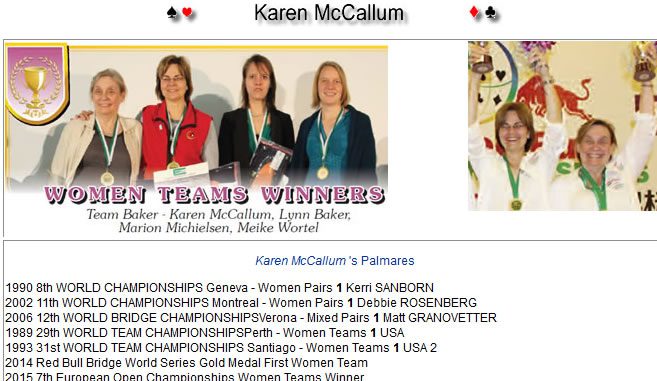
Championne du Monde
Bridge to the world
Karen on Worldbridge
System card with Lynn Baker 2015
How to Maximize your chances of winning by Karen Thomas McCallum PDF
Kate’s rules to live by courtesy of K.T. McCallum PDF
Bridge Judgment by Karen Mc Callum PDF
Two gentlewomen from Verona or … Rude and unpleasant behavior at the table is a perennial problem in tournament bridge by Karen McCallum PDF
Extract from Bulletin Number 4 – Wednesday 27th February 2008
Gold Coast Congress 2008 Editor David Stern
 Kate aka Karen is one of the finest bridge players in the world. She is well known for her
Kate aka Karen is one of the finest bridge players in the world. She is well known for her
aggressive style as well as her well founded theories on the game. She was born in born in San Francisco and has confessed to being just into her sixties. She moved to New York City (Greenwich Village) in the early 1970’s and settled in an old white farmhouse in a tiny town in New Hampshire since the mid 1990’s. Even though I didn’t ask the question – my omission of course – she is happily married to the man of her dreams for 29 years.
When she was around 20 her first (short-lived) husband was a graduate student at Ohio State when she was a freshman (in those days it was probably a freshwoman). She was appropriately in awe of his Notre Dame credentials and his bridge prowess (which turned out to be nil, but what did she know at the time?).
He played nearly every night in their living room with 5 or 6 of his Notre Dame buddies so she pretty m
uch had to learn – or get rid of the husband (she did both!). The guys used to put her in the game occasionally when they needed a fourth, and then yell at her for everything she did. She learned perforce but resisted all the way hating it because of the behaviour (not much has changed there in 40 years)
Kate quit bridge again in 1972 and kibitzed for a few years when she moved to New York. She would have been terrified to play among the likes of Al Roth, Edgar Kaplan, B.J. Becker, Ira Rubin, Victor Mitchell, Tobias Stone, Sam Stayman among others especially as she was, by her standards, a novice. Although she knew the rudiments,  Matthew Granovetter really taught her the game during that time – so she regards him as her true teacher. She quit again in 2003 – because of the dreadful behaviour of the players but was dragged back kicking and screaming in 2006, by her « so-called » friends who say they couldn’t win without her – she admits to being subject to flattery every timeKate plays professionally 3 to 4 days a week and with that schedule doesn’t really have time for ‘social’ games but would in Australia where bridge is still fun.
Matthew Granovetter really taught her the game during that time – so she regards him as her true teacher. She quit again in 2003 – because of the dreadful behaviour of the players but was dragged back kicking and screaming in 2006, by her « so-called » friends who say they couldn’t win without her – she admits to being subject to flattery every timeKate plays professionally 3 to 4 days a week and with that schedule doesn’t really have time for ‘social’ games but would in Australia where bridge is still fun.
Kate’s love of bridge is sparked by good opposition and/or fun people and learning – there’s always a new discovery .Kate is an avid reader of bridge books reading almost daily. She keeps books by Terence Reese next to her bed. Her most recent book was Krzysztof Martens – « Dynamic Declarer Play” while her favourite book is Victor Mollo’s « Confessions of an Addict ». She is very keen to play in a Bermuda Bowl (Open world Championship) but doesn’t think it will happen. She also wants to continue teaching and helping her students develop and hopefully win a world  championship with Lynn Baker, her friend and partner who has worked hard for it for many years.
championship with Lynn Baker, her friend and partner who has worked hard for it for many years.
Her most memorable bridge moment
was running 2nd place with one board to go in the London Sunday Times Invitational (1992) with Sally Brock. 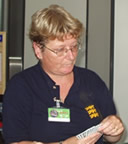 In a star-studded field (she considered that they were the pigeons!), and never lying below 5th place throughout the event they faced Boris Shapiro and Irving Gordon (Haggis) who bid a terrible grand slam against them on the last board (on a bidding misunderstanding!). Their trump suit was
In a star-studded field (she considered that they were the pigeons!), and never lying below 5th place throughout the event they faced Boris Shapiro and Irving Gordon (Haggis) who bid a terrible grand slam against them on the last board (on a bidding misunderstanding!). Their trump suit was
AQJ53 facing T64. Haggis made it with good card reading – used his only entry to play low toward the AQJ53 and picked up her singleton King. (As usual, she had done too much advertising in the bidding to make this a distinct possibility!) They lost 200+ IMPs across the field (the biggest loss suffered by any pair in the entire event), and ended up 10th. But
it was a moment…
What makes Kate a good player and good partner?
Tenacity and Workaholism (her word). She never gives up, not even when they are getting buried. Her strength lies in competitive bidding and weakness definitely in declarer play. She confesses to being a terrible partner, too critical and too much of a perfectionist. But she loves her regular partners dearly (Lynn Baker,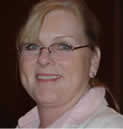 Kerri Sanborn and Matthew Granovetter) so she works very hard on controlling her
Kerri Sanborn and Matthew Granovetter) so she works very hard on controlling her
weaknesses – but, as she says “they keep coming back so I must be somewhat successful in communicating to them that it’s not the sort of partner I want to be.” Strong influences on her game have been: Victor Mollo, Matthew Granovetter, Kit Woolsey, Kerri Sanborn.
 If she could play with anyone in the world it would be Zia but she’s done that. It’s so much fun that she doesn’t mind losing when she plays with him – and his bridge is highly entertaining as well. She describes him as creative, a perfect gentleman and very kind to opponents and while she has been lucky enough to play with most of the world’s best – Zia is a standout favourite.
If she could play with anyone in the world it would be Zia but she’s done that. It’s so much fun that she doesn’t mind losing when she plays with him – and his bridge is highly entertaining as well. She describes him as creative, a perfect gentleman and very kind to opponents and while she has been lucky enough to play with most of the world’s best – Zia is a standout favourite.
Cancer changes bridge champion’s perspective
By Adam Dolge in Porthmouth Herald Local News
adolge@seacoastonline.com
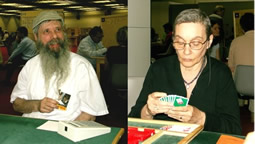 EXETER – Karen McCallum has been out of town on business for the past several weeks. She’s a professional card player.Not the kind that might immediately come to mind, but a professional bridge player, and the 60-year-old Exeter woman has been at the World Bridge Championships in Italy.On June 12 at the Fiere convention center in Verona, « Kate » and teammate Matt Granovetter won the gold medal in the pairs competition. Her trophy will be added to the four other gold medals she’s received in world bridge tournaments.
EXETER – Karen McCallum has been out of town on business for the past several weeks. She’s a professional card player.Not the kind that might immediately come to mind, but a professional bridge player, and the 60-year-old Exeter woman has been at the World Bridge Championships in Italy.On June 12 at the Fiere convention center in Verona, « Kate » and teammate Matt Granovetter won the gold medal in the pairs competition. Her trophy will be added to the four other gold medals she’s received in world bridge tournaments.
In their 18th century home on Main Street, husband Alex McCallum showed off the old section of the house, previously used as a mechanics garage. Thousands of mystery books line the walls and a glass cabinet showcases the numerous awards she’s won in her more than 30 years playing the card game.Not only does she take home prize money and medals, but she is sponsored by other bridge players to compete on their teams.
Lynn Baker, a law professor and attorney from Texas, hired McCallum and a team to compete in this year’s tournament.In a phone interview as she and her team took a break from competition and traveled to Venice, Kate said her recent victory was exciting, but not like wins in the past.
On April 1, 2005, she went in to Exeter Hospital for a mammogram and nine days later she was diagnosed with breast cancer. She and doctors wasted no time and on April 14 she had a lumpectomy. Traces of cancer were found in her first lymph node, a sign that it was starting to spread.She was treated at Exeter Hospital with an aggressive approach. On May 10 she underwent a mastectomy. »I’m astounded by what a good hospital it is, » she said. « For a small town we have just remarkable people. »
As Kate talked about her treatment at Exeter Hospital, Alex let her know her surgeon called to congratulate her for the recent gold medal.In between the surgery and chemotherapy, she continued playing bridge and even joined a couple of tournaments, including one in Las Vegas.In June, after participating in a European championship, she returned home to undergo chemotherapy and would not compete again until March of this year. »My husband took good care of me, » she said, adding support from family and friends helped her through a very difficult time.Even though the treatment made her sick, only able to stomach Cup o’ Noodles and chocolate milkshakes, she found temporary relief in playing bridge on the Internet with others around the world. »Because of the Internet I was able to play online, » she said. « It was helpful because I found that for me, my way of dealing with difficulties is I can tune everything out and not think at all about how I feel and get on with what I do. When I was really sick, I could blot it out completely and sit on my computer and play bridge and almost pretend I didn’t feel so bad. »Through her treatment she lost 50 pounds and her long dark hair.The couple met in 1976 in New York City. At the time Kate had been playing bridge for a number of years with the country’s top players at clubs in the city. She moved from Ohio, where she got her start in the bridge world, to New York City in 1972.
Baker’s Dozen by Kate McCallum 13 Tips for winning
Extract from Bulletin Number 4 – Wednesday 27th February 2008
Gold Coast Congress 2008 Editor David Stern
 Kate has played regularly with Lynn Baker for many years, and has agreed to share 13 of their favourite agreements
Kate has played regularly with Lynn Baker for many years, and has agreed to share 13 of their favourite agreements
1. POINTS DON’T TAKE TRICKS.
You can take tricks with high cards: aces, kings and queens, etc. You can take tricks by trumping.You can develop a long suit for tricks. The better your hand fits with partner’s, the more tricks you will be able to take by ruffing in one hand, or both. You can even take tricks on power with 7’s and 8’s sometimes – when all the high cards are played on one or two early tricks in a suit. But in all the years I have played bridge I have never seen a point take a trick! Stop relying on the high-card point count as your only, or primary, guide to the value of your hand.Look at your hand’s trick-taking po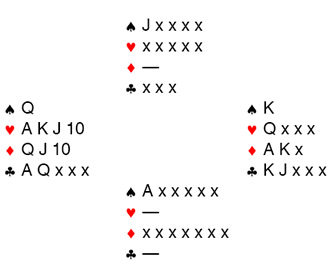 tential. Look at the degree of fit with partner, at the spot cards, at the positional value of your cards (are your kings behind their aces, does it look like the finesses are onside for you, or offside?). Look at your stoppers in their suits. Of course, high-card points can also be a useful guide to the value of your hand, particularly on balanced hands. It’s hard to make 3NT with two balanced hands unless you have something pretty close to the old- fashioned Goren requirement of 26 points. But you can take a whole lot of tricks, with very few HCPs, when your hands are unbalanced. You can count your high-card points if you want to (I don’t unless my hand is balanced), but make that only one of many factors you consider in your bidding decisions. Example: Here’s a five-point grand slam, admittedly not so easy to reach.
tential. Look at the degree of fit with partner, at the spot cards, at the positional value of your cards (are your kings behind their aces, does it look like the finesses are onside for you, or offside?). Look at your stoppers in their suits. Of course, high-card points can also be a useful guide to the value of your hand, particularly on balanced hands. It’s hard to make 3NT with two balanced hands unless you have something pretty close to the old- fashioned Goren requirement of 26 points. But you can take a whole lot of tricks, with very few HCPs, when your hands are unbalanced. You can count your high-card points if you want to (I don’t unless my hand is balanced), but make that only one of many factors you consider in your bidding decisions. Example: Here’s a five-point grand slam, admittedly not so easy to reach.
Six clubs is a great slam East-West, but goes down because of a diamond ruff or two. Meanwhile,
7♠ is cold the other way!
2. IF IT’S NOT IN THE NOTES, WE DON’T PLAY IT.
Even if you’ve discussed a cute idea that you and your partner want to try, one of you may beunsure about whether you’ve agreed to actually play it. If you make this rule in your serious partnership(s), it will save you from many unnecessary accidents. Until it’s written down in your partnership notes, assume you don’t have an agreement. You may both know that you should be playing it, and that you want to, but it’s better to agree to stick to your notes and play what’s written there, despite system discussions in between notes-updates.
3. CHOICE OF GAMES COMES BEFORE SLAM BIDDING.
Bids below game are designed to get to the right game, or to 3NT from the right side of the table if that is an option. Example:
West North East South
1♠ 2♥ 3♣ pass
3♦ pass 3♥?
This 3♥ bid is not a cuebid in support of diamonds. It’s fishing for 3NT, asking West to bid it with anything resembling a half- stopper. Yes, if East later comes back in diamonds, the 3♥ bid could be reinterpreted as an “advanced cuebid” but at the point it’s bid, it’s simply looking for the best game.
4. DON’T SELL AT THE 2-LEVEL WHEN THE OPPONENTS HAVE A FIT
In other words, don’t defend at the two level if either side appears to have an 8-card fit. When is the last time you got a good board for defending 2♥ when they had 8+ trumps? I can’t remember myself. (OK, this doesn’t always apply — when they bid 1♠ – 2♠, you might be vulnerable without a decent fit. But it usually applies.)
5. A PARTNERSHIP IS ONLY AS STRONG AS ITS WEAKEST LINK
If you or your partner are not feeling strong, you won’t play your best game. This applies to teams as well. If one of your team-mates is weakened, for whatever reason (physically or psychologically), your team is handicapped. So get your team-mates and partners playing their very best by being a good, supportive, loyal partner and team-mate. Your partner is your best friend.
6. DON’T BE AN EASY OPPONENT
If you pass a lot, and rarely pre-empt, and always have your bids, your partner will find you an easy partner to play with. But your opponents will love you even more. They won’t have any problems reaching their best contracts against you. And your partner won’t make as many good leads against them as your more active counterparts do, because he won’t know as much about your hand.
7. PAY ATTENTION TO THE LAW OF TOTAL TRICKS
If you don’t know it, learn it. If you know it and don’t believe in it, take a second look – you won’t regret it. In the 25+ years I’ve used LOTT as a guideline to competitive bidding, I’ve rarely seen a hand where it was wrong.However… there are a lot of misconceptions out there about LOTT. It is much abused. Contrary towhat I frequently hear, LOTT does not mean that you can just count your trumps and blindly contract for that number of tricks (i.e., 9 trumps means that we’re safe to bid to the 3-level). If it were that simple, we would all have given up bridge a long time ago.The Law of Total Tricks is merely an observation of the phenomenon that the total number of tricksavailable, to both sides, is usually equal to the total number of trumps held by both sides. If wehave 9 hearts, and they have 10 spades, there will usually be 19 total tricks. But they may have 12of those 19, and we would have only 7. Or, we may have 11 tricks and they will be able to take
CAUTION: There are several factors that can affect the total number of tricks available. For example, when there’s a great deal of distribution, total tricks will usually be higher, by one or even two tricks. When the hands are flat, total tricks will often be lower. In other words, there will sometimes be one more, or one less, trick available than the total number of trumps. It’s important to learn what to watch for so that you can make an educated guess about the number of tricks available. It takes practice, but you’ll find that your “guesses” will be fairly accurate in time.
While it is true that, because of LOTT, you are usually safe to bid to the level equal to the number of trumps your side holds, that’s a common over-simplification that will lead to bad results. You have to do some thinking, don’t just blindly bid to the 4-level every time you have 10 trumps.
For example, if you’re not Vul opponents have most of the HCP’s with an 8-card fit, and you are Vul with your 10 trumps, it won’t be a good idea for you to go -1100 at the 4-level, even if they can make a slam. If they have 12 tricks, you have only 6 (18 trumps, 18 tricks). You have to use LOTT
with some common sense. The best way to begin to apply LOTT is to add methods to your partnership that make it easy for you to know how many trumps you have (for example, use support doubles), and how many cards you have in their suit. Then think about the scoring table before you bid again in competition.
Frequently, this will entail stopping at the 2-level with 8 trumps, bidding to the 3-level with 9 trumps,
or to the 4-level with 10 trumps, etc. A great way to learn LOTT is to take Larry Cohen’s course at Bridgetoday.com.
8. MAKE THE OPPONENTS MAKE THE LAST GUESS
Bid as high as you can as fast as you can. Bid to a level where you aren’t sure what it’s right for them to do. In other words, see #6 and #7.
9. PARTNER NEVER HAS THE RIGHT HAND.
If you have a tough bidding decision to make on your own, without enough input from partner, then assume that your partner does not have the cards you need. Sometimes he will have them and you’ll miss a good contract. But the vast majority of the time he will have the wrong hand, and you’ll find yourself going minus.
Last night I held:
♠ — ♥ A K x x ♦ x ♣ A K Q J 10 x x x.
The auction was 2♥ on my left, pass from partner, 2♠ on my right. It’s very tempting to bid a slam, but following my own advice, I didn’t play partner for the perfect hand. I knew that, if she had the ♦A, I could gamble that I would find something useful and make 6♣, otherwise I’d play in 5♣. And I had the tool to find out. We play Specific Ace Blackwood. If I bid 4NT, she’ll bid 5♣ with no ace and I can pass. She’ll bid 5♦ with the ♦A and I can bid a slam. But if she bids 5♠ with the ♠A, I will almost certainly be too high. Accordingly, I disciplined myself (not easy) and bid 3♠ (ostensibly asking for a stopper for 3NT), then followed with 5♣ to show a powerful hand. My caution was rewarded when dummy produced: ♠ 8 x x x x ♥ J x ♦ x x x x x ♣ x. I made 5♣ on the nose.
10. BE AGGRESSIVE ABOUT BIDDING GAMES AT IMPS
Particularly vulnerable games. But otherwise bid games conservatively. At matchpoints you can often get a good score by making overtricks – you don’t need to bid thin games. And you’ll get a bad score when your pushy games go down.
The scoring table doesn’t really make not Vul games at IMPs an odds-on proposition, so it doesn’t really pay to be too aggressive. But when you’re Vul, the scoring table is very much in your favour. So bid those thin games and win some imps.
11. BID SLAMS CONSERVATIVELY.
A lot can go wrong, even with a “cold” slam. Be particularly conservative about slam bidding at matchpoint scoring, where going down in a bad slam will be close to a zero. Also, be cautious about bidding slams when the opponents are in the bidding at a high level – the suits are not going to be breaking well. The rocks of distribution have defeated many a good slam. I once heard Bob Hamman say that if he never bid another slam, he’d probably be doing better
than he does now. And Bob Hamman is usually right.
12. IF TWO PEOPLE AT THE TABLE THINK I’M GOING DOWN, AND I’M ONE OF THEM, I
DON’T PLAY THERE.
For example, partner opens 2♠ and you find your side doubled for penalties after:
West North East South
2♠ Pass Pass Double
Pass Pass ??
If your hand as East is something like♠ — ♥ K J x x ♦ K x x x x ♣ Q 10 x x
you know you are in big trouble in 2♠, and your RHO thinks so too. So you should try to improve the contract. It isn’t going to cost much if you’re wrong. Consider it a “Free Chance.” You could redouble, or bid 2NT, either one will be interpreted as “Help!!!!” Similarly, If RHO opens 4♥, and you choose to overcall 4♠ holding:
♠ A Q 10 x x ♥ x ♦ A Q J x x ♣ K x,
you won’t be surprised to go down when LHO doubles 4♠. You and LHO are in complete agreement – 4♠ isn’t going to make. So get yourself out of it. You could bid 5♦ or, again, you could redouble, just in case partner has long clubs. If he doesn’t he’ll bid 4NT and you can try 5♦. (But be sure you’re playing with a partner who agrees that this is an SOS redouble before you try it.)
13. BE A DISCIPLINED PARTNER.
Have what your partner expects you to have. Whatever your agreements are, stick to them.
CAUTION: “Disciplined” does not mean “sound.” It means just what it says – disciplined. It’s just as bad to pass when partner expects you to make a light overcall, as it is to overcall on a light hand when partner expects you to be sound. Despite the myriad of systems and styles employed by expert players around the world, from very sound to very aggressive, from highly artificial to totally natural, there is very little systemic edge for any one approach in the long run. Good players who are playing well will win with any methods. But no matter how well they are playing, the most important factor in winning is partnership. You can’t win if your partner doesn’t know what’s going on.Stay within your agreements, whatever they are. Stick to them like glue so that your partner knows exactly what to expect from you at all times. He’ll make better decisions and your scores will improve.
CALL THE SHERIFF
Those players who know me also know that I have an interest in appeals and that I often sit on appeals committees. However this recent director’s ruling from the USA gives me some comfort in the sanity of such committees – if not the directors. In the recent tournament the following took place. When asked the meaning, East said, « I don’t know. » West said, « No agreement. » It seems that the director ruled in favour of the non-offending side on the basis of ‘differing explanations’ – go figure. The Appeals Committee saw sense and restored the table result, i.e. against the non-offending side. If anybody is in doubt about why the game may not be expanding perhaps this is a good
